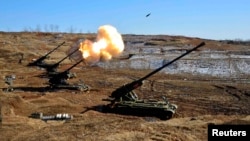The United States is "closely monitoring the situation" as North Korea begins live-fire artillery exercises near its disputed western sea boundary with South Korea.
State Department spokeswoman Jen Psaki said the U.S. also continues to urge Pyongyang to "exercise restraint and refrain from actions that raise tensions."
Pentagon spokesman Rear Admiral John Kirby said Pyongyang should instead worry about feeding its impoverished people.
The U.S. response came after North Korea Tuesday fired 50 rounds of artillery, none of which landed in South Korean territory.
The North held similar drills last month. Some of the artillery landed in the South's waters, prompting Seoul to fire back across the boundary.
North Korea disputes the Northern Limit Line boundary, saying it was unilaterally imposed and should be drawn farther south.
Such drills are not unusual, but typically further strain relations between the two long-time rivals, which are still technically at war.
Tensions already are higher than usual following warnings that Pyongyang may be preparing to conduct a fourth nuclear test. During a visit to Seoul last week, U.S. President Barack Obama warned that another test would only further isolate the North.
On Tuesday, a North Korean Foreign Ministry spokesman said his country "will advance along the road of bolstering up nuclear deterrent, unhindered," and he reaffirmed it will "not rule out a new form of nuclear test."
In Beijing, Chinese Foreign Ministry spokesman Qin Gang told reporters, "We hope the relevant parties can take actions conducive to easing the situation and maintaining peace and stability on the peninsula."
Despite being a long-time ally of North Korea, China has put pressure on the country to resume six-nation talks aimed at denuclearizing the Korean peninsula.
North Korea has conducted nuclear tests in 2006, 2009, and 2013 in violation of United Nations Security Council resolutions.
State Department spokeswoman Jen Psaki said the U.S. also continues to urge Pyongyang to "exercise restraint and refrain from actions that raise tensions."
Pentagon spokesman Rear Admiral John Kirby said Pyongyang should instead worry about feeding its impoverished people.
The U.S. response came after North Korea Tuesday fired 50 rounds of artillery, none of which landed in South Korean territory.
The North held similar drills last month. Some of the artillery landed in the South's waters, prompting Seoul to fire back across the boundary.
North Korea disputes the Northern Limit Line boundary, saying it was unilaterally imposed and should be drawn farther south.
Such drills are not unusual, but typically further strain relations between the two long-time rivals, which are still technically at war.
Tensions already are higher than usual following warnings that Pyongyang may be preparing to conduct a fourth nuclear test. During a visit to Seoul last week, U.S. President Barack Obama warned that another test would only further isolate the North.
On Tuesday, a North Korean Foreign Ministry spokesman said his country "will advance along the road of bolstering up nuclear deterrent, unhindered," and he reaffirmed it will "not rule out a new form of nuclear test."
In Beijing, Chinese Foreign Ministry spokesman Qin Gang told reporters, "We hope the relevant parties can take actions conducive to easing the situation and maintaining peace and stability on the peninsula."
Despite being a long-time ally of North Korea, China has put pressure on the country to resume six-nation talks aimed at denuclearizing the Korean peninsula.
North Korea has conducted nuclear tests in 2006, 2009, and 2013 in violation of United Nations Security Council resolutions.





